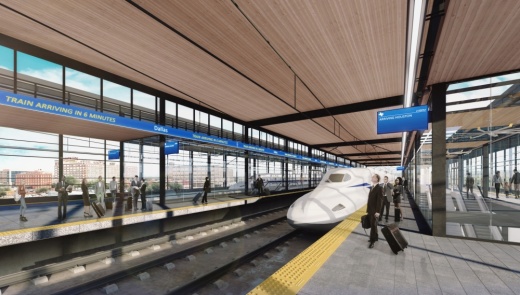The case centers on a 236-mile high-speed rail line between Houston and Dallas being planned by the company Texas Central. Filed by landowner Jim Miles in 2016, the lawsuit argues that Texas Central does not qualify as a "railroad company" under state law and therefore cannot use eminent domain to acquire land needed to construct the line.
The Supreme Court declined to review the case in June, allowing a decision by an appeals to court to remain in place that ruled Texas Central was a railroad company. Shortly after the court declined review, Miles issued a statement announcing he would file a motion for a rehearing.
In the Oct. 15 order granting a rehearing, the Supreme Court set a date of Jan. 11 to hear oral arguments.
In a statement, officials with Texas Central said they were confident the court would rule in their favor.
“Texas Central looks forward to our time with the Supreme Court in January," according to the statement. "We remain confident that, ultimately, the Texas Supreme Court will conclusively resolve this issue in Texas Central’s favor, agreeing with the court of appeals’ well-reasoned decision and concluding that Texas Central qualifies as an entity entitled to use survey and eminent domain authority under the Texas Transportation Code.”
Opposition groups Texas Against High-Speed Rail and ReRoute the Route celebrated the motion.
"We are so thankful the Texas Supreme Court decided to listen to the voices of numerous stakeholders who raised significant concerns about the proposed high-speed rail project," said Jennifer Stevens, a spokesperson for ReRoute the Route, in a statement. "The Texas Supreme Court recognized this is an issue that is of great importance to Texas, and they will take their time to consider all relevant facts."
Texas Central has pitched the rail project as an alternative to car travel on the highly traveled route between Houston and Dallas. The trip would take roughly 90 minutes with one stop in College Station, and prices would be competitive with airlines, officials said. The cost of the project is pegged at $20 billion on the company's website, and funding sources could include private investments, commercial loans and federal loan programs.
Some landowners, including Miles, have refused to sell their land to the company needed to build along the selected route, prompting the courtroom showdown. Officials with Texas Central have previously said eminent domain would only be used as a last resort.
Construction was anticipated to start in late 2021 or early 2022, but it is unclear if the renewed Supreme Court case will affect those projections.





